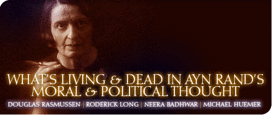Thanks to Doug, Roderick, and Mike for further food for thought.
Starting with the most recent: Mike is right that you can’t go from “Living things face an alternative of existence or non-existence” to ethical egoism. But of course Rand introduces a whole lot of other premises to get there: all living things, including the human variety, have a specific nature and must act according to that nature to achieve survival; our means of survival is reason, which functions volitionally; to survive we must survive as rational beings, which means both “by using our reason well” and “preserving our ability to reason well” (the latter is implicit); to reason well and live accordingly is to be virtuous. Now I don’t mean that the conclusion is strongly supported by these premises, since prudent free-riding is one way of reasoning well as a means to survival and preserving the ability to reason well. But I do think that the mistake in the passage from the starting point to the conclusion is not as naïve or obvious as Mike seems to. And the particular problem I’m identifying is a problem with all ancient theories.
If I understand Roderick correctly, I guess he disagrees with me on the last point. I find the following from Seneca inspiring, but I think it doesn’t face the toughest issue:
… a human being’s constitution is a rational one, and so a human being’s attachment is to himself notqua living being but qua rational being; for he is dear to himself in respect of what makes him human. (Letters to Lucilius 121.)
The toughest issue is that doing the right thing can lead not just to death, but something far harder: prolonged torture and degradation of the self or of those we love (see Solzhenitsyn’s Gulag Archipelago), or destruction of the very capacity for happiness (see Todorov on evil and the story of the absent father in the movie Swing Kids), or even of the capacity for moral agency (see Swing Kids again). In both the Gulag Archipelago and Swing Kids, the choice one is presented with is between saving oneself and those one is closest to from these consequences, on the one hand, and saving one’s comrades and one’s cause, on the other. What is the rational thing to do in such circumstances? Like Cicero, I find one answer convincing one day, and the other the next day. Like Sidgwick, I think practical reason is divided.

